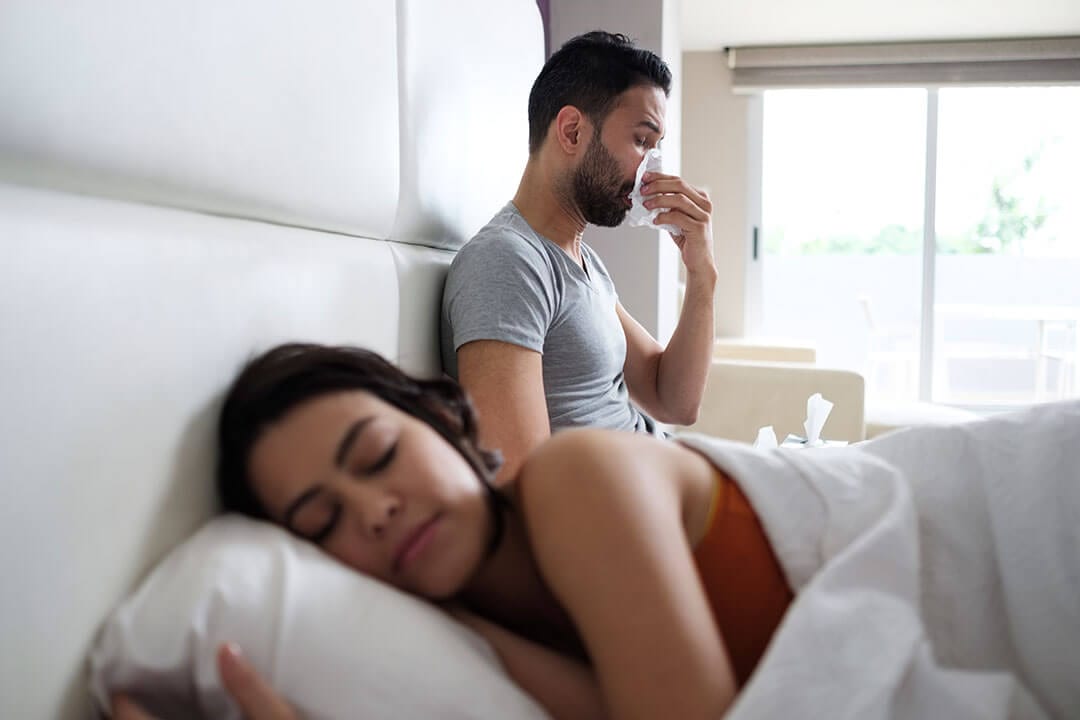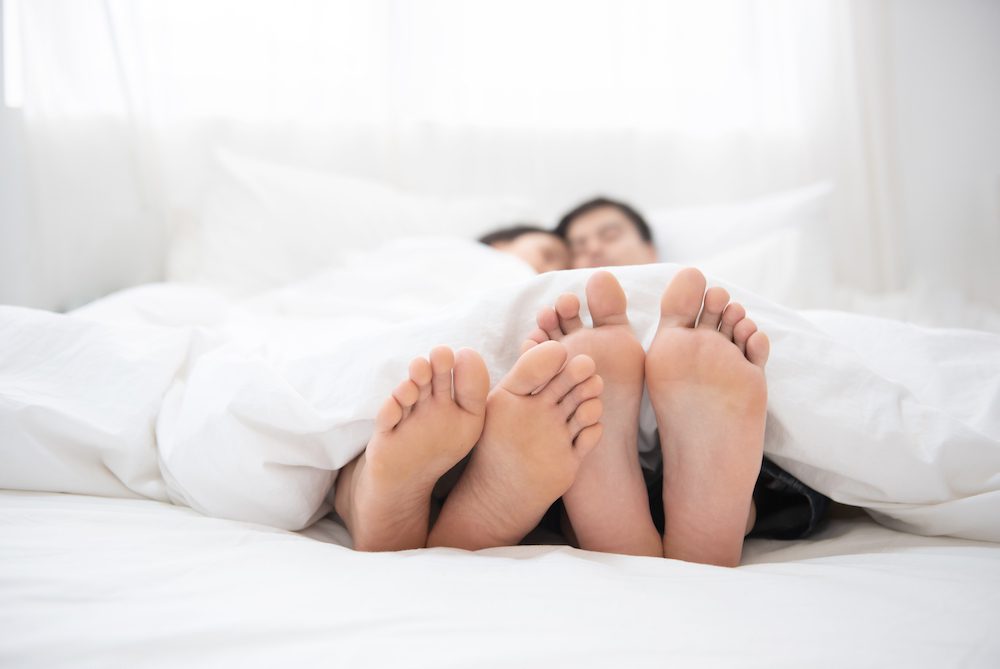Chronic obstructive pulmonary disease (COPD) is a common health condition that causes the airway in the lungs to get inflamed, narrowed, and damaged. COPD and its symptoms can cause severe breathing problems and affect how people sleep at night.
Can COPD Affect Sleep?
COPD can negatively affect sleep. In addition, sleep issues may also affect COPD symptoms and outcomes. Many people with COPD experience sleep disruptions and studies indicate that 70% have poor-quality sleep. Common sleep complaints people with COPD have include nighttime awakenings, waking up to urinate, waking up too early, coughing at night, or loud snoring.
COPD may also affect sleep in other ways.
- Symptoms: People with COPD may wake up in the middle of the night, cough loudly, or feel that they cannot breathe well. COPD symptoms like wheezing, congestion, or pain may lead to poor sleep quality or disrupted sleep.
- COPD medications: Scientists are still uncovering how COPD medications impact sleep. It’s common for people on certain COPD medications, including oral and inhaled steroids, to experience sleep problems. However, one study found that certain types of inhaler medications are not linked to poor sleep quality.
- Sleep architecture: Fragmented sleep is common with COPD. Sleep studies have found that people with COPD tend to have increased nighttime arousals, lower sleep efficiency, reduced total sleep time, less slow wave sleep and rapid eye movement (REM) sleep. They also have increased rates of wakefulness after falling asleep.
Is COPD Worse at Night?
In some people, COPD can cause difficulty breathing or shortness of breath that’s worse when lying down. Also, people with COPD often struggle with low blood oxygen levels which can become more severe during sleep.
COPD-related breathing problems typically occur during REM sleep, because a person with COPD may breathe too slowly during this sleep stage. Lying on the back during sleep also plays a role in affecting respiratory effort during sleeping.
Some people with COPD report that their symptoms are worse in the morning. Morning COPD symptoms are associated with an increased risk of flare-ups and diminished daytime functioning.
Nighttime COPD symptoms are associated with sleep disturbance and may have an impact on flare-ups, heart health, cognitive functioning, and mental health.
Sleep Problems in People With COPD
Sleep disorders are common among people with COPD. The condition is associated with sleep problems like insomnia, restless legs syndrome, and obstructive sleep apnea (OSA). Other common issues people with COPD experience are poor sleep quality and nighttime breathing problems.
It’s important for people with COPD to get enough quality sleep each night. Inadequate sleep can contribute to flare-ups, nighttime COPD symptoms, and worsened health outcomes. Lack of quality sleep is also connected to an increased risk of having severe and life-threatening flare-ups and breathing problems.
COPD is linked to a number of sleep problems:
- Restless legs syndrome (RLS): About 37% of people with COPD have RLS, whereas the prevalence of RLS in the general population only ranges from about 3% to 15%. RLS is a sleep disorder that causes a person to have an uncomfortable or unpleasant urge to move their legs when they are inactive or at night.
- Insomnia: COPD is associated with an increased likelihood of insomnia. People with insomnia find it hard to fall asleep, stay asleep, or attain quality sleep. It is the most common sleep disorder among people with COPD, and can lead to issues such as daytime sleepiness, diminished work or school performance, and accidents.
- Decreased sleep quality: Poor quality sleep is a common sleep problem in people with COPD. Not getting enough quality sleep is associated with poor COPD-related health outcomes, including depression, anxiety, reduced well-being, impaired cognitive functioning, and premature death.
COPD and Sleep Apnea
Overlap syndrome is a term used to describe when someone has both COPD and obstructive sleep apnea. OSA is a highly prevalent sleep-related breathing disorder that causes the airway to close during sleep. Of people with COPD, an estimated 10% to 30% also have OSA.
Having both COPD and OSA can lead to serious health outcomes and flare-ups. That said, using continuous positive airway pressure (CPAP) treatment to treat OSA may diminish the adverse effects of having both conditions.
How to Sleep With COPD
If you have COPD, there are multiple steps you can take to help yourself sleep better at night, manage COPD symptoms, and prevent health complications.
Change Your Sleep Position
Consider sleeping on your side or with your head and back elevated by 30 or more degrees. Using a wedge pillow or an adjustable bed can help you keep your head elevated during sleep. Try to avoid sleeping flat on your back. Your posture during sleep affects the muscles used to breathe. Sleeping on the back may place these muscles in a position that negatively impacts their capacity and how they function.
Limit Fluids Before Bed
Waking up in the middle of the night to use the bathroom is a common cause for sleep disruptions among people with COPD. To avoid nighttime urination, avoid drinking water, other beverages, caffeine, or alcohol in the evening. Consider keeping a journal to better monitor how often you’re drinking beverages and using the bathroom during the day.
Staying hydrated is important, so be sure to drink enough fluids during the daytime even if you limit them at night. Drinking with meals and when you feel thirsty is likely going to provide you enough water for your body’s needs.
Try to Relax
If you’re not able to fall asleep after lying in bed for 20 minutes, consider getting out of bed and doing a relaxing activity before trying to sleep again. Meditation, reading a book, or even listening to soothing sounds may help you reduce stress in order to fall asleep. Stress reduction may be particularly helpful for those with COPD since it can help with breathing and sleep. Consider incorporating relaxation techniques into your nighttime routine, like practicing mindfulness or doing relaxing breathing exercises before going to bed.
Use an Air Purifier
Use a HEPA air purifier to eliminate pollutants from your bedroom and home. It’s important to avoid breathing in air pollutants, because inhaling air pollution, chemicals, and fumes can add to COPD symptoms. In people with COPD, air pollution is linked to worsened symptoms, lower well-being, and flare-ups.
Avoid Smoking
Smoking is a leading cause of COPD and can significantly worsen COPD symptoms for individuals who already have it. Additionally, all tobacco products contain nicotine, which is a stimulant and can have negative effects on sleep. Quitting smoking can improve symptoms, enhance lung function, and increase overall quality of life for people living with COPD. Talk to your doctor if you need help quitting smoking. If using nicotine replacement aids, be careful to stop usage a few hours before bed.
Stay Active During the Day
Make an effort to stay active or exercise. Regular physical activity is linked to better COPD outcomes, reduced hospitalizations, and lower death rates. Exercise is also linked to improved mental and physical well-being and reduced fatigue and breathing problems.
Experts in general recommend exercising earlier in the day and not in the 2 hours before bedtime to improve sleep. Be sure to check with your doctor before starting a new workout regimen. A healthcare provider will be able to help you determine the best type of physical activity for your unique needs and determine if it is safe to exercise depending on your condition.
Cut Out Screen Time
Avoid using electronic devices at night, for at least an hour before your scheduled bedtime. When you’re unable to sleep at night, it may feel tempting to browse on your phone, watch TV, or use other electronic devices. However, light exposure from a screen can disrupt your sleep schedule and lead to you staying up later.
Optimize Your Bedroom
Your bedroom environment can play a role in helping you relax and sleep well through the night. Make sure your bedroom is dark, quiet, and cool enough for sleep. If you tend to wake up in the middle of the night to use the bathroom, consider using a dim red light to help minimize bright light disrupting sleep. Ear plugs or a white noise machine can help limit noise exposure.
Have a Sleep Schedule
Create and maintain a consistent sleep schedule with the same wake and sleep times to make sure you’re getting enough sleep every night. Maintaining a consistent sleep schedule promotes proper regulation of the circadian rhythm, allows for sufficient rest and recovery, enhances cognitive function, stabilizes mood, supports physical health, and helps prevent sleep disorders. Consider establishing a relaxing pre-sleep routine, creating a sleep-friendly environment, or limiting daytime napping to help you maintain your sleep schedule.
Avoid Alcohol
It’s beneficial to avoid drinking alcohol, especially in the evening or close to bedtime. Alcohol can harm sleep quality. Also, drinking alcohol can impact breathing in people with COPD.
Speak With a Doctor
Tell a doctor if your COPD symptoms are keeping you from sleeping through the night. A doctor can evaluate your current treatment plan, adjust your medication regimen, or provide additional care as needed.
COPD can be a serious condition that can require hospitalization. It is important to seek medical help if your condition limits your wellbeing or sleep.
If you are experiencing trouble breathing or your symptoms are becoming more severe, please call 911 or visit an emergency medical facility.
References
Ask the Sleep Doctor
Have questions about sleep? Submit them here! We use your questions to help us decide topics for articles, videos, and newsletters. We try to answer as many questions as possible. You can also send us an email. Please note, we cannot provide specific medical advice, and always recommend you contact your doctor for any medical matters.



